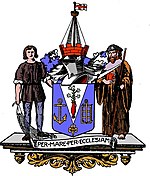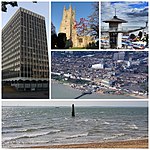Fossetts Farm Stadium
Fossetts Park is the provisional name for a football stadium proposed to be built in Southend-on-Sea, Essex, England as a new home for Southend United F.C. to replace its current town centre Roots Hall Stadium. The name may be changed if sponsorship for the stadium is secured. Initial proposals for the new stadium emerged in 1998; planning permission was applied for, and later confirmed by Southend Council, in 2008 but at that time the scheme depended entirely on financing from a proposed adjacent retail and leisure development, which failed to happen. In 2020, a new deal was agreed, based instead on delivery of 1300 new homes, split between the Fossetts Farm site (c. 800) and Roots Hall (c. 500). However, council planning approval for revised plans including a 16,226-seat stadium had still not been given in February 2023.
Excerpt from the Wikipedia article Fossetts Farm Stadium (License: CC BY-SA 3.0, Authors).Fossetts Farm Stadium
Fossetts Way, Southend-on-Sea Prittlewell
Geographical coordinates (GPS) Address Nearby Places Show on map
Geographical coordinates (GPS)
| Latitude | Longitude |
|---|---|
| N 51.5587 ° | E 0.7212 ° |
Address
Fossetts Way
Fossetts Way
SS2 5QP Southend-on-Sea, Prittlewell
England, United Kingdom
Open on Google Maps









